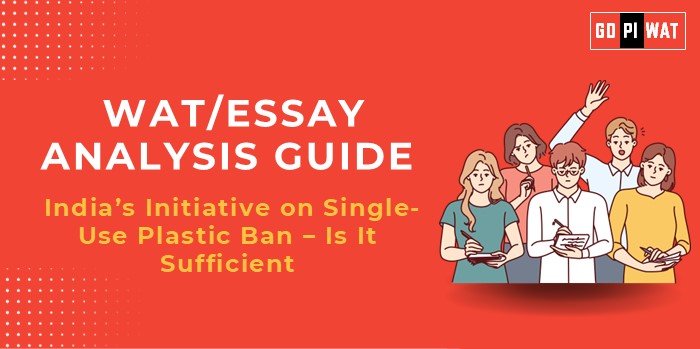📋 Written Ability Test (WAT) / Essay Analysis Guide
🌍 Topic: India’s Initiative on Single-Use Plastic Ban – Is It Sufficient?
🌟 Understanding the Topic’s Importance
India’s ban on single-use plastics (SUP) reflects its commitment to sustainability. However, implementation challenges, such as lack of affordable alternatives and enforcement gaps, raise questions about its sufficiency. This topic connects with broader issues like environmental policy, green innovation, and sustainable business practices.
🕒 Effective Planning and Writing
- Time Allocation:
- 📖 Reading & Planning: 5 minutes
- ✍️ Writing: 20 minutes
- 🔍 Review: 5 minutes
- Structure:
- 📌 Introduction: 70 words
- 📖 Body: 360 words
- 📜 Conclusion: 70 words
✨ Introduction Techniques for Essays
- Contrast Approach: “While India bans single-use plastics, the nation struggles to replace these with affordable, eco-friendly alternatives—a paradox of ambition and reality.”
- Solution-Based Approach: “India’s ban on SUP could succeed if coupled with incentives for alternatives and stricter enforcement mechanisms.”
- Global Comparison Approach: “India joins a global movement against SUP, yet its approach contrasts sharply with the stricter frameworks in countries like Rwanda.”
📊 Structuring the Essay Body
🎉 Achievements:
- 📜 Legislative framework prohibits 19 SUP items, targeting 36% of global plastic waste contributors.
- ♻️ India’s recycling rate of 60% highlights progress, although most SUP remains non-recyclable.
⚠️ Challenges with Comparative Analysis:
- 🌍 Despite restrictions in over 60 countries, including China and Canada, enforcement gaps persist in India.
- 🔍 The ban targets 19 items but does not address broader waste management for 4.13 million tons of annual plastic generation.
🚀 Future Outlook:
- 🔧 Policy recommendations include stronger enforcement mechanisms and investments in scalable recyclable alternatives.
- 📚 Public awareness campaigns and industry collaborations are vital for long-term success.
📜 Concluding Effectively
- Balanced Perspective: “India’s SUP ban is a commendable start but requires holistic strategies for enforcement, innovation, and education to achieve its full potential.”
- Global Example-Based: “Learning from Kenya’s strict enforcement and Canada’s innovation in alternatives, India can strengthen its SUP ban for lasting impact.”
🔧 Recommendations for Sustainable Progress
- 💰 Introduce subsidies and incentives for affordable alternatives.
- 📈 Strengthen monitoring and penalties for violations.
- 📢 Increase public awareness and industry engagement through campaigns.
📝 Sample Short Essays
- Balanced Perspective: “The SUP ban marks a pivotal moment in India’s sustainability journey, yet its success hinges on robust enforcement and innovation.”
- Solution-Oriented: “By incentivizing alternatives and enforcing stricter penalties, India can make the SUP ban both effective and equitable.”
- Global Comparison: “India’s SUP ban is a step forward, but learning from countries like Rwanda and Kenya could ensure long-term success.”


